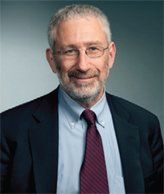Maurie Markman on the Groundbreaking TAPUR Trial
In this interview we discuss ASCO's first trial, TAPUR (Targeted Agent and Profiling Utilization Registry), which is examining 17 different commercially available drugs in settings outside of their indication.
Oncology (Williston Park). 31(3):158, 168.

Maurie Markman, MD

1. There are currently myriad cancer clinical trials available to patients. What sets the TAPUR (Targeted Agent and Profiling Utilization Registry) trial apart from other traditional clinical trials?
DR. MARKMAN: From my perspective, TAPUR, which has been organized and is being conducted by the American Society of Clinical Oncology (ASCO), is a paradigm-changing trial. It takes advantage of the extraordinary advances that cancer scientists and clinicians have made and which led to our understanding of what cancer is all about. Cancer is a genetic disease caused by abnormalities in the genes. Rather than treating every cancer the same way based upon its site of origin-the breast, the lung, the colon-it gets down to the molecular level of each patient’s cancer and asks the question: Can we find an effective antineoplastic agent for that patient based upon that abnormality?
There are other trials that have begun to explore this concept, but again, with TAPUR we are talking about 17 different drugs, all commercially available for some purpose, from multiple pharmaceutical companies. The idea that you could have two pharmaceutical companies working together in the same trial is extraordinary, and here we have more than half a dozen.
I simply cannot overstate the significance of the effort that has been put together by ASCO, led by their Chief Medical Officer Richard Schilsky, MD, who has put this together over the course of several years. The trial is currently active and accruing patients.
2. TAPUR is ASCO’s first clinical trial. What role is the Society playing in this trial and what has its influence been on the design and implementation?
DR. MARKMAN: I am not a spokesperson for ASCO, but I am a member of the Society. I had nothing to do with the trial’s concept other than when I heard about it several years ago; I was supportive of it, and continue to be today. Dr. Schilsky and colleagues were able to get a number of pharmaceutical companies to agree to make their drugs available as part of the trial. The US Food and Drug Administration (FDA) has found this to be an acceptable study, as have institutional review boards and scientific reviews. The logistics of getting this drug to the right patient based upon specific molecular targets is a tour de force. I believe ASCO, its leadership, and the administrative groups that have assembled this trial are to be congratulated and supported. I cannot say it enough-this is an extraordinarily important trial. In my opinion, it is one of the most important trials that has ever been conducted in oncology.
3. Is the trial focusing on any specific diseases? If so, which ones-and why?
DR. MARKMAN: It is the exact opposite, actually, which is the whole point of this trial. The design is very clear. The trial includes commercially available drugs approved by the FDA for specific indications. However, in TAPUR, these drugs are being examined in settings where there is a theoretical reason that the drug might be of benefit, because the patient has a tumor type with a relevant molecular target. But since the specific drug has not been approved for this newly identified use, clinical data need to be generated to prove the potential value of the drug in that setting. Sometimes we may think a particular drug makes sense in a particular setting, but when we test it at the clinical level, we find that we had an inaccurate thought process.
The intent of TAPUR is to use these commercially available drugs that have already been proven safe, in a setting where there may be an actionable target, but for which the drugs have not been indicated as standard of care.
4. Is the trial using genomic testing to identify possible targets for patients? If so, how is this being done, and how many alterations or mutations are being tested?
DR. MARKMAN: Multiple alterations are being looked at, depending on molecular characteristics of the 17 drugs. All of them have potentially different targets. I should add that there is certainly the possibility in the future that there will be other drugs added to the trial, and there may be additional targets as well. The key here is that a patient, if he or she elects to, undergoes molecular testing to see if there are abnormalities in their tumor that might be relevant. The patient and doctor should discuss this, and whether it makes sense for that particular patient. If, after the molecular test is done, there ends up being a potential match between the patient’s target and a drug, the patient can be asked about participating in TAPUR, but not before all of these steps have been completed.
5. If there are researchers, clinicians, or patients out there who might be interested in TAPUR, how can they get more information?
DR. MARKMAN: In general, there is a lot of information available about TAPUR through the ASCO website, since it is their trial (http://www.cancer.net/navigating-cancer-care/how-cancer-treated/clinical-trials/what-tapur-study). The Cancer Treatment Centers of America group is proud of being one of the first to participate in this trial nationally (http://www.cancercenter.com/ctca-difference/tapur/).
Financial Disclosure:Dr. Markman is on the Speakers Bureau of AstraZeneca and Genentech; he also serves on the Medical Advisory Board of Celgene.